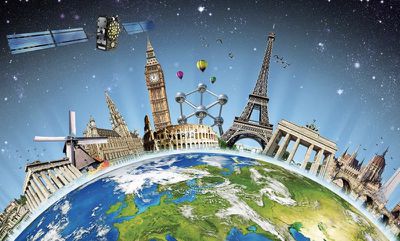The iPhone 8, iPhone 8 Plus, and upcoming iPhone X include support for Galileo, Europe's Global Satellite Navigation System. While this information has been listed on Apple's iPhone technical specifications page since the devices debuted earlier this month, it's a feature update that's received little attention.
Galileo joins existing support for the Global Positioning System (GPS) operated by the U.S. government, the Global Navigation Satellite System (GLONASS) operated by the Russian Aerospace Defense Forces, and QZSS, the regional Quasi-Zenith Satellite System used in Japan.

According to the European Global Navigation Satellite Systems Agency, Galileo support in the new iPhones will allow users to benefit from more precise positioning that's able to combine GPS, GLONASS, and Galileo signals. Galileo, says the agency, has a modern signal structure that's able to help users better maintain their position fix when navigating through cities worldwide.
Multi-satellite support also increases signal availability in urban areas where buildings can obstruct the sky and limit the number of visible satellites. Galileo has 15 operational satellites in orbit and three that are in testing, compared to 31 GPS satellites and 24 GLONASS satellites. By 2020, Galileo is expected to have 30 satellites operational.
Worldwide support for QZSS is also new in Apple's 2017 iPhone lineup. iPhone 7 and iPhone 7 Plus models sold in Japan previously supported QZSS, but now all iPhones offer the feature. QZSS, unlike Galileo, GPS, and GLONASS, is limited to three satellites and is receivable only within Japan.
























Top Rated Comments
Sad ...
Here's a summary over at IEEE Spectrum: Superaccurate GPS Chips Coming to Smartphones in 2018 ('https://spectrum.ieee.org/tech-talk/semiconductors/design/superaccurate-gps-chips-coming-to-smartphones-in-2018')
I agree that Apple is having an annus horribilis with its iPhone line. But the iPad Pro 10.5 sent the competition blasting off once again.
You should probably move to MacHaters.com
Also, Galileo provides a new global search and rescue service. Its satellites could relay a distress signal from an iPhone (if Apple supports it) to the nearest rescue centre (under the International Cospas-Sarsat Programme), which will then begin a rescue operation. Also, its the first positioning system that can return a message to inform the user that their distress signal has been received and help is on its way.
All new cars sold in the EU will be required to support Galileo from 2020.